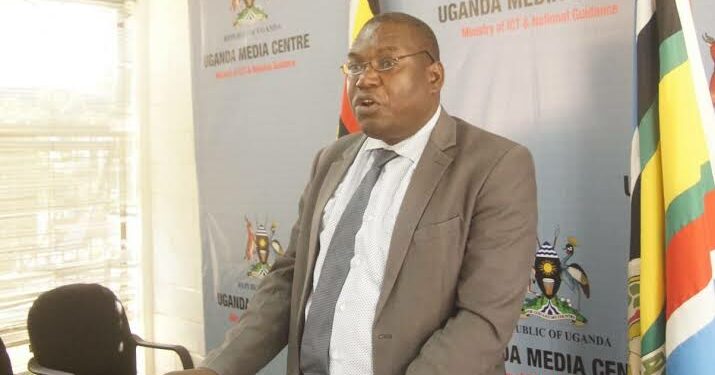By Felix Oketcho
Jonathan Kamwana, Commissioner for Teacher education and training in the Ministry of Education has asked parliament to speed up the process of approving financial budget for Uganda National Institute of Teacher Education (UNITE)
to commence its operations.
UNITE will be a degree-awarding institute for all teachers in the country.
Currently, NTCs train diploma secondary school teachers (Grade V), whereas PTCs have hitherto been training primary school teachers (Grade III).
“We have submitted our draft to Parliament and cabinet ministers for guidance. our taskforce also submitted technical
workplan comprising of teaching programmes for approval,” Kamwana told teachers at two days education symposium held at Silver springs hotel Kampala under theme: Coping with Covid 19 and its impact on the education sector the teacher’s role.
Carol Kavuma, Coordinator UNITE task force, said it has completed the development of five programmes that will be rolled out, including bachelor of science with education, bachelor of arts in education, bachelor of primary education and bachelor of early childhood education which have to be approved by the National Council for Higher Education.
Dr Jane
Egau, Commissioner for teacher education and instruction at the education ministry said under the new arrangement degree will be the minimum standard for one to teach in the country, across all levels of education, including Early Childhood Centres.
“The ministry has put the focus on skilling our learners, but this has to start with us the teachers. We are streamlining to have a standardized award for teachers in the country,”
Egau-Okou said, the ministry is finalizing agreements with the Shimon Core PTC board of directors to turn the college into a degree-awarding institute.
currently there are 46 public PTCs and 10 private ones spread across the country.
There are also five NTCs in Uganda: Unyama (Gulu), Mubende, Kabale, Kaliro and Muni (Arua). Both PTCs and NTCs will offer only degree courses.
Alex Kakooza, permanent secretary ministry of education said the ministry is undertaking several reforms aimed at producing a learner for the world of work.
According to him,reforms include streamlining teacher education and the business, technical, vocational education and training (BTVET).
“The plans are not only for teachers, but we will also establish a national technical university where BTVET students can enroll for continuity,” he said.
Uganda is implementing the 2019 National Teacher Policy that requires all teachers at all levels to have a bachelor degree in education as a minimum qualification.
About half a million teachers will be affected by the policy that aims to professionalise and improve the quality of teaching, but is expected to trigger the indefinite closure of half of the 46 Primary Teachers Colleges (PTCs), which are currently training teachers.
Some teachers who are affected argue that the process to obtain degrees will be too lengthy, costly and stressful, which might force some of them to leave the profession all together.
The National Teacher Training Colleges issue teaching diplomas (also called Grade V). The Grade III and V teaching qualifications, formerly required, are now replaced with a bachelor degree.
For instance, teachers who were trained as nursery school teachers (Grade III qualifications) have to first acquire diplomas to match the equivalent of an A-level which will allow them entry into a university degree programme in Uganda. This suggests that it may take a teacher several years to upgrade.
Jonathan Kamwana anticipates 9,200 lecturers and 1,380 tutors in the 23 PTCs to be closed to lose their jobs. The PTCs will be turned into secondary schools, skilling centres, or technical institutions, depending on the needs of the areas where they are located, said Kamwana.
Dr John Chrysestom Muyingo, the state minister in charge of higher education, said that the Uganda Ministry of Education and Sports is searching for funding to finance the upgrading of teachers’ qualifications.
Professor Fred Masagazi, the principal of the College of Education and External Studies at Makerere University advises that, before implementation of the new reforms in teacher education, the ministry should carry out extensive consultation and research, in addition to reviewing past reports, that have been developed in line with teacher education in the country.
“It is critical that, whenever you are working on a policy like this, you consult the stakeholders – teachers, parents, institutions of higher learning like Makerere, because to come up with a policy requires scientific decisions, research and evidence,” said Masagazi.
Joseph Gonzaga, a member of parliament and said degrees do not determine the quality of the teachers output saying it is the type of system, management and remuneration that matters.
“One of the factors affecting teachers is poor pay. When you tell them to go and get degrees, where will they get the money and when they improve their qualifications, will the pay match the higher qualification?” he asked.
Juma Mwamula, the general secretary of the Uganda Private Teachers’ Union, says those with Grade III qualifications should be allowed to enrol directly for degrees (as opposed to obtaining A-levels first).
“The national teacher institute should design special programmes for these teachers at their levels,” said Mwamula.
He argued that many teachers are currently not financially stable and have families to take care of and might, therefore, not upgrade at all.
Do you have a story in your community or an opinion to share with us: Email us at editorial@watchdoguganda.com









